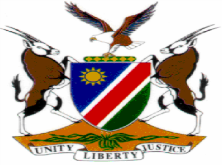REPUBLIC OF NAMIBIA NOT REPORTABLE

HIGH COURT OF NAMIBIA NORTHERN LOCAL DIVISION, OSHAKATI
JUDGMENT
Case no: CR 1/2017
THE STATE
and
JEREMIA MICHAEL ACCUSED
(High Court Case no. 405/2016)
Neutral citation: State v Michael (CR 1 /2017) [2017] NAHCNLD 17 (3 March 2017)
Coram: TOMMASI J et JANUARY J
Delivered: 3 March 2017
Flynote: Plea — Plea of guilty in terms of s 112(1)(a) of the Criminal Procedure Act 51 of 1977 as amended by the Criminal Procedure Amendment Act 13 of 2010 — Provision utilised to speedily dispose of minor offences sentences – Magistrate ought to apply discretion judiciously to determine if case is a serious or minor offence.
Summary: The accused was charged with assault with the intention to do grievous bodily harm. The particulars of the charge indicated that the accused had used a knife to cut the left ear of the complainant. The magistrate, at the behest of the State Prosecutor, convicted the accused in terms of section 112(1)(a).
The court held that the Learned magistrate erred when he convicted the accused in terms of section 112(1)(a). The court further held that the court further erred by imposing an excessive fine which the accused was unable to pay.

ORDER

1. The conviction and sentence are set aside;
2. The matter is remitted to the magistrate with a direction that it be dealt with afresh from the stage of plea.
3. In the event of a conviction, the sentencing court must have regard to the sentence already served and/or the fine already paid.
___________________________________________________________________
JUDGMENT

TOMMASI J (JANUARY J CONCURRING):
[1] This matter came before me on automatic review. The accused was charged with assault with the intent to do grievous bodily harm and he was convicted on his plea in terms of the provisions of section 112(1)(a) of the Criminal Procedure Act 51 of 1977 as amended.1 He was sentenced to a fine of N$5000 or two years’ imprisonment.
[2] In S v Onesmus; S v Amukoto; S v Mweshipange 2011 (2) NR 461 (HC) Liebenberg J, stated the following on page 463 paragraph 5:
‘From the wording of s (1) of s 112 it is clear that the presiding officer is authorised to convict an accused on his bare plea of guilty where he or she is of the opinion that the offence in question does not merit certain kinds of punishment; or a fine exceeding N$6000. The presiding officer therefore has a discretion which must be exercised judiciously. This discretion will mainly be influenced and determined by the circumstances of any particular case and the information available to the presiding officer, allowing him or her to form an opinion. It seems to me that in order to make a judicial discretion at all possible, there has to be sufficient information before the court to rely on, which would enable it to reach a decision as to the procedure to be followed.’
The idea behind s 112(1) (a) is for the court to speedily dispose of minor offences. (See S v Aniseb and Another2).
[3] Despite these reported judgments and several other unreported judgments, State Prosecutors continue requesting magistrates to dispose of serious offences in terms of s 112(1)(a) of Act 51 of 1977 as amended by the Criminal Procedure Amendment Act 13 of 2010 and magistrates continue to do so without applying his/her judicial discretion to determine whether it is the proper procedure to adopt.
[4] The offence in casu is assault with intent to do grievous bodily harm. Clearly this was not a minor offence. Furthermore, the particulars of the charge clearly states that a dangerous weapon (a knife) was used in the commission of the offence. These were clear indications to the court that this was not a matter which could be disposed of in terms of s 112(1)(a) of the Act.
[5] The prosecutor, after conviction, called the complainant to testify in aggravation. The accused during cross-examination disputes that he cut the complainant with a knife. If the magistrate had applied his discretion herein, he would have questioned the accused in terms of section 112(1)(b) to determine whether he admitted all the elements of this offence. The State Prosecutor, during his/her address to the court in aggravation made the following statement ‘…, although the state regret to ask the court to act in terms of section 112(1)(a).’ Having come to this conclusion the State Prosecutor proposes the maximum fine provided for in terms of the act.
[6] Like in the Onesmus case, supra, the accused herein is unemployed and does not have the means to pay the fine imposed by the court. The accused in all probability is currently serving the custodial portion of the sentence imposed.
[7] It is evident that the magistrate failed to exercise his discretion judiciously and the procedure is found not to be in accordance with justice. A further delay in this matter would be prejudicial to the accused. In view of these factors the court dealt with this matter without obtaining a statement from the concerned magistrate.
[8] In the result the following order is made:
1. The conviction and sentence are set aside;
2. The matter is remitted to the magistrate with a direction that it be dealt with afresh from the stage of plea.
3. In the event of a conviction the sentencing court must have regard to the sentence already served and/or the fine already paid.
___________________
MA TOMMASI J
Judge
___________________
HC JANUARY
Judge
1 by the Criminal Procedure Amendment Act 13 of 2010
2 1991 NR 203 (HC) (1991 (2) SACR 413) at 415g – i.
3